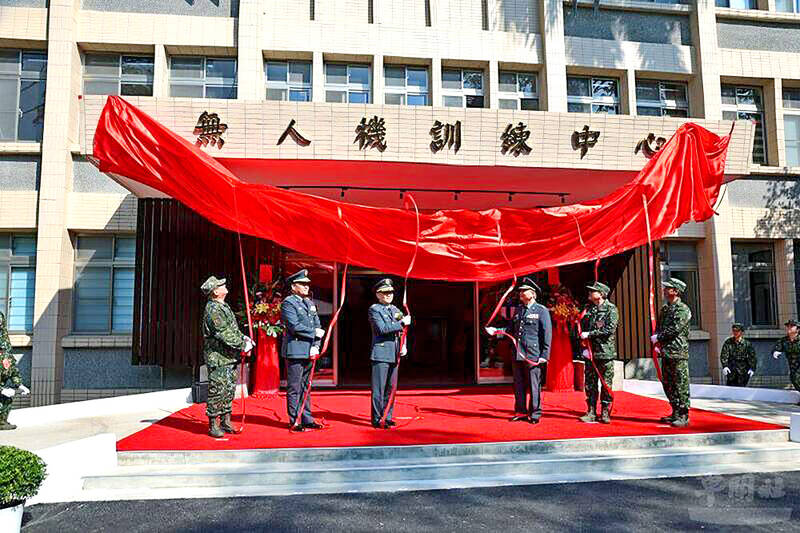The army on Friday inaugurated its Uncrewed Aerial Vehicle (UAV) Training Center, with Vice President Hsiao Bi-khim (蕭美琴) and Minister of National Defense Wellington Koo (顧立雄) in attendance watching a brief exercise demonstrating its capabilities in using drones for reconnaissance and combat.
The center is part of the army’s Education, Training and Doctrine Development Command, and is tasked with teaching basic drone operations and maintenance, as well as fostering teaching talent, drone tactics, and research and development, Commander of Army Headquarters General Lu Kun-hsiu (呂坤修) said.
The center’s inauguration symbolized the army’s advances in developing asymmetrical combat capabilities, he said.

Photo courtesy of Military News Agency
Drones would be a critical force and component in future warfare, and the army’s focus on drones also demonstrates that the army is aware of developing trends for future warfare and is making efforts to embrace those trends, Lu said.
Hsiao, making the visit at the Neijiao Base on behalf of President William Lai (賴清德), thanked the center’s officers and soldiers for their dedication and hard work over the past year, and their families for their support.
Lai has instructed that the military should keep abreast of new technologies, such as drones and artificial intelligence (AI), and mull the utilization of such technologies to improve national security, Hsiao said.
Hsiao said the Lai administration emphasized the development of various types of drone platforms for military use, such as submersible drones and stealth-capable maritime drones, and other military-specification drones allowed for commercial use.
In line with this focus, the government has developed an Aerospace and Drone Industry Park in Chiayi County’s Minsyong Township (民雄), using the west wing of the Chungshan Institute of Science and Technology complex in the area, she added.
The government has also encouraged private companies to focus on drone development and become part of the global supply chain for drone components or manufacturing, she said.
In an interview with Lithuanian National Radio and Television on Dec. 16 last year, Hsiao said that Taiwan hoped to collaborate with like-minded partners worldwide to develop AI, which would play a significant role in future industries.

An essay competition jointly organized by a local writing society and a publisher affiliated with the Chinese Communist Party (CCP) might have contravened the Act Governing Relations Between the People of the Taiwan Area and the Mainland Area (臺灣地區與大陸地區人民關係條例), the Mainland Affairs Council (MAC) said on Thursday. “In this case, the partner organization is clearly an agency under the CCP’s Fujian Provincial Committee,” MAC Deputy Minister and spokesperson Liang Wen-chieh (梁文傑) said at a news briefing in Taipei. “It also involves bringing Taiwanese students to China with all-expenses-paid arrangements to attend award ceremonies and camps,” Liang said. Those two “characteristics” are typically sufficient

A magnitude 5.9 earthquake that struck about 33km off the coast of Hualien City was the "main shock" in a series of quakes in the area, with aftershocks expected over the next three days, the Central Weather Administration (CWA) said yesterday. Prior to the magnitude 5.9 quake shaking most of Taiwan at 6:53pm yesterday, six other earthquakes stronger than a magnitude of 4, starting with a magnitude 5.5 quake at 6:09pm, occurred in the area. CWA Seismological Center Director Wu Chien-fu (吳健富) confirmed that the quakes were all part of the same series and that the magnitude 5.5 temblor was

The brilliant blue waters, thick foliage and bucolic atmosphere on this seemingly idyllic archipelago deep in the Pacific Ocean belie the key role it now plays in a titanic geopolitical struggle. Palau is again on the front line as China, and the US and its allies prepare their forces in an intensifying contest for control over the Asia-Pacific region. The democratic nation of just 17,000 people hosts US-controlled airstrips and soon-to-be-completed radar installations that the US military describes as “critical” to monitoring vast swathes of water and airspace. It is also a key piece of the second island chain, a string of

The Central Weather Administration has issued a heat alert for southeastern Taiwan, warning of temperatures as high as 36°C today, while alerting some coastal areas of strong winds later in the day. Kaohsiung’s Neimen District (內門) and Pingtung County’s Neipu Township (內埔) are under an orange heat alert, which warns of temperatures as high as 36°C for three consecutive days, the CWA said, citing southwest winds. The heat would also extend to Tainan’s Nansi (楠西) and Yujing (玉井) districts, as well as Pingtung’s Gaoshu (高樹), Yanpu (鹽埔) and Majia (瑪家) townships, it said, forecasting highs of up to 36°C in those areas